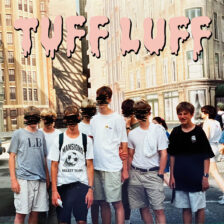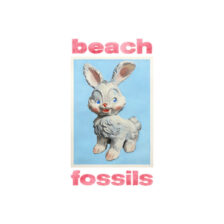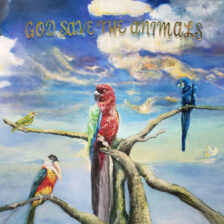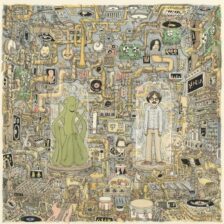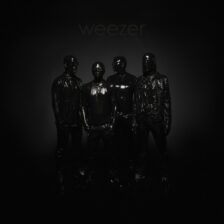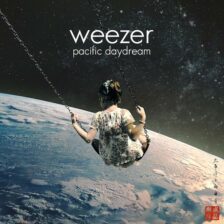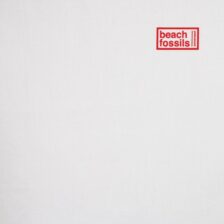If I was in Hovvdy, I would be very tired of the word “nostalgia” by now. It’s been mentioned in countless write-ups and reviews (this one now included), singling out the band’s biggest strength — down-to-earth earnestness and relatability — and occasionally spinning it as something manufactured. Any detractors of the band are unlikely to change their minds about Hovvdy’s new self-titled double album, although fans will no doubt be pleased that the band continues to retain their carefree and approachable image, likely because it serves as such a complement to their songwriting. Even more than 2021’s True Love, Hovvdy fulfills the goal of most self-titled records, as well as the goal of many records this far into a band’s career; it is kaleidoscopic while remaining cohesive, a defining work by an artist in their prime that captures nearly every sound the band has explored over their first decade of existence.
Read More “Hovvdy – Hovvdy”Review: Mansions – Tuff Luff
You know a band means something to you when you can remember your first time hearing them.
The first time I heard Mansions, I was a junior in high school working at our local supermarket. About once a week, my older brother (forever shaman of my music tastes) would load up whatever he was listening to on my iPod so I would have new music for bus rides and the lunch breaks where I’d step outside and smoke cigarettes bought for me by a friend. To this day, the songs I associate with that first job – and much of my junior and senior years of high school – are Mansions’, a band skilled at capturing the whirlwind of youthful emotions I was experiencing at the time.
Read More “Mansions – Tuff Luff”Review: Beach Fossils – Bunny
For years, it started to feel like Beach Fossils were going out on top. It’s been six years since the release of their last proper album, Somersault – an album I called “near-perfect” and “a breath of fresh air” on this very site. Six years isn’t quite Modest Mouse time, but it’s enough to make you wonder if a band may have simply run out of steam and rode off into the sunset. And if they did, who could blame them? Beach Fossils has amassed a stronger body of work in seven years than many other bands do in a lifetime.
We got to have some fun on the interim – piano versions of their own songs and a Yung Lean cover leaned into the band’s penchant for sparse beauty, something they’ve played with to this day. But it was the release of lead single “Don’t Fade Away” and the announcement of their fourth studio album, Bunny, that really caught fans’ ears. Beach Fossils were back, and with an instant classic that harkened back to 90s jangle-pop (Gin Blossoms, anyone?) under their wing, it felt like they never left. And that’s a feeling that defines Bunny, an album that ultimately feels like an amalgamation of the band’s previous work. Put simply, it’s a greatest-hits record comprised of entirely new material.
Read More “Beach Fossils – Bunny”Review: Alex G – God Save the Animals
Alex G doesn’t do a lot of interviews, but for being a rising enigma in DIY and indie-rock, he seems like a pretty normal guy. In a recent Pitchfork feature, Giannascoli admitted to doing a lot of things on the fly; sure, he’s always writing, but when it comes to the prolific singer-songwriter’s experimental textures and vocal distortions, he’s really just trying to create something he finds interesting. (Ironically, he’s also convinced that every new project he releases is his worst, at least initially.) Giannascoli chose the title God Save the Animals based on intuition, and to further prove the down-to-earth nature of his work, he chose which studios the album was recorded at based on who was available that day.
All this to say, if Giannascoli isn’t being meticulous about his constantly evolving craft, he could have fooled us. At times, God Save the Animals sounds as lush (“Cross the Sea”) as Rachel Giannascoli’s watercolor artwork; elsewhere, it sounds barren, quiet, and lonesome (“Ain’t It Easy”). The album does exactly what most new albums should: it takes the best aspects of Alex G’s past work (his long-term penchant for storytelling, Rocket’s relatively straightforward, country-leaning compositions, and House of Sugar’s use of striking electronic flourishes and pitch-shifted vocals) and miraculously weaves them into something new. The album is rich with details that become more rewarding with every listen, making God Save the Animals not only an album of the year contender, but among the best work of the songwriter’s career.
Read More “Alex G – God Save the Animals”Review: Teen Suicide – Honeybee Table at the Butterfly Feast
Sam Ray is the most likable person in indie rock. If you didn’t pick up on my sarcasm there, it’s not your fault; it doesn’t translate well to text. In actuality, many people have many reasons to dislike Sam Ray, from his scathing send-up of Car Seat Headrest to his honest albeit prickly online persona and, perhaps most notably, the needlessly edgy moniker of teen suicide itself. Whether these reasons are valid enough to dismiss his music as a whole is totally your call, but I’m here to deliver the message that Ray’s newest album (and first since American Pleasure Club’s fucking bliss, a dark night of the soul via noise-rock), honeybee table at the butterfly feast, is one of the year’s most moving surprises.
Read More “Teen Suicide – Honeybee Table at the Butterfly Feast”Review: Weezer – OK Human
Rivers Cuomo is a popstar. It’s an interesting revelation considering the Weezer frontman has spent the better half of the last 25 years chasing mainstream recognition (something the band has had since releasing their first single, “Undone – The Sweater Song” in 1994), but for as many times as he’s turned his band into a modern pop-rock experiment and apologized for it on the very next album, Cuomo continues to craft unbelievable earworms, whether he’s utilizing a team of co-writers and producers or simply his strat with the lightning strap.
To understand and accept this is to be a Weezer fan. Just as it’s been noted that the singular band has essentially split into two — one putting out weird records while the other puts out, well, Weezer records — fans can rarely know what to expect when they hear new music is coming, even when it’s been described to them beforehand. Put simply, we’ve been burned before, and we’re all ready to feel like clowns the day after a new single drops and it sounds closer to Twenty One Pilots than the band that wrote “Keep Fishin’.” Still, we have a reason to be excited; it seems that the plastic, filler-ridden mid-career crisis that plagued the band in the late 2000s is over. Since 2014’s Everything Will Be Alright in the End, the band has (more or less) released consistent albums that, at the very least, keep Weezer fans guessing. While they still jet back and forth between pop-rock and expertly executed power-pop, there’s energy once again present that seemed to disappear somewhere around 2007’s self-titled red album. Weezer seem invested in the music they’re making (having averaged a new album each year since 2014), and more importantly, the records they’re making feel like Weezer records – even the weird ones. For my money, their latest is the closest the band has come to merging those two lanes; OK Human is a left-field masterpiece that comes dangerously close to reaching the heights of the band’s early career.
Read More “Weezer – OK Human”Review: Weezer – Weezer (The Black Album)
“You say it’s a good thing that you float in the air/That way, there’s no way I will crush your pretty toenails into a thousand pieces.”
Thus ends “Only in Dreams,”the closing track of Weezer’s 1994 debut Weezer (The Blue Album). Over time, and within the context of the song, these are words written about a girl so unforgettable, so unavoidable, that she is in the air and “in your bones.” (She’s also your ride home.) But the first time I heard this song – sometime around 2005 when I was 11 – I had absolutely no idea what those lyrics meant. I only knew that they were perfect, sounding suitably epic against the song’s explosive eight minutes.
Now, 13 studio albums into their career, fans and critics alike are still picking at Rivers Cuomo’s words as if they’re enough to justify ostracizing the band for another quarter century. Besides, they’re complete nonsense. Didn’t you read that piece about his spreadsheets? Each song is constructed to give the impression of a singular idea, but in reality, none of the words were actually written to go together. It’s all meaningless.
Review: Weezer – Weezer (Teal Album)
The internet giveth and the internet taketh away.
Late last May, a 14-year-old Twitter user created an account dedicated to getting Weezer, now uniquely divisive in this stage of their career, to cover “Africa,” Toto’s 1982 hit and a resurging meme in the same lineage of Smash Mouth’s “All-Star” and Owl City’s “Fireflies.” Now, eight months later, the cultural tides have shifted. “Africa” has been viciously chewed up and spit out by the merciless internet machine, largely due to the outrageous popularity that accompanied Weezer’s studio cover. The song peaked number one on the Billboard Alternative Songs chart, the band’s first number one hit since 2007’s “Pork and Beans.” The band closed shows with it, made a bizarre, self-referential music video starring Weird Al for it, and even teased the song’s release with a superior cover of another Toto single, “Rosanna.”
In less than a year, “Africa” became the sort of meme your family would recognize or bring up in casual conversation, essentially nullifying the status it once held and finalizing its new residence in the lexicon’s void.
Review: The Sidekicks – Happiness Hours
Happiness Hours should go down as one of the great pop artifacts of 2018. It may not be suited for Top 40, but it checks all the boxes of a great pop album. Frontman Steve Ciolek has mastered the art of turning highly personalized lyrics into something absorbing and universal; like a DIY Matt Berninger, he possesses the songwriting ability to make anyone nostalgic for a specific time in their life while distinctly singing about his own. An exercise in duality, the album’s guitars are sunny and clean, except for when they go down a darker, more distorted path. Happiness Hours presents pop music in two different lights, equally as weird and ambitious as it is bright and polished, often within the same four minute song.
Review: Frank Turner – Be More Kind
It’s almost difficult to dislike an album as inherently positive as Be More Kind. In today’s draining political and cultural climates, Frank Turner not only believes that change is possible, but that it begins within each of us. In fact, if there’s an overarching criticism to be made about the album, it’s that these songs tend to veer into the brand of vague optimism that’s better employed lining the inside of Hallmark cards. But sometimes, even those messages can be refreshing to hear, and considering the relatively low energy on display, Turner’s heart, technical ability, and good intentions carry Be More Kind a considerable distance.
Review: Kindling – Hush
“Rap is the new rock n’ roll,” Kanye West declared in a passionate 2013 interview with Zane Lowe, and whether you like it or not, he’s right. Any passing glance at how Top 40 has change over the past 35 years will confirm mainstream radio’s transition into pop and hip-hop. Even major rock releases this year from genre mainstays like Foo Fighters and Weezer were quickly set aside in favor of the stronger, more youthful voices of artists like Open Mike Eagle and Big K.R.I.T.
Ultimately, this leads us to a larger conversation centered around age, privilege and politics, but short of (re)writing a thesis about the importance of hip-hop in 2017, I offer you this: rock music, as a general genre tag, is dead in the water. Where it continues to thrive, however, is in niche markets – select corners of internet forums like this one and on DIY airwaves, where new bands attempting to revive everything from dream-pop to post-punk are offered equal opportunities to share their vintage visions. One such place is DKFM, an L.A.-based radio station operated by shoegaze blog When The Sun Hits, where cuts from Kindling’s massive new album, Hush, have become regular rotation.
Review: Weezer – Pacific Daydream
Over the span of nearly 25 years, Weezer have come to be known for a lot of things – frontman Rivers Cuomo’s absurdist lyrics, the goofy Beach Boy persona that seems to contradict his well-documented reclusiveness, a series of self-titled albums known by their respective color palettes – but staying in one place for long has never been one of those things. And so it is unsurprising following the relative critical success of 2014’s Everything Will Be Alright in the End and 2016’s Weezer (White Album) that Pacific Daydream is an inconsistent album by a band whose entire career could be defined by the very same word.
If Pacific Daydream doesn’t sound like the album fans expected, it’s likely because it wasn’t the album the band originally intended to deliver. Fans of Weezer (White Album) rejoiced when Cuomo spoke of a darker, more experimental follow-up, naturally titled Weezer (Black Album). But that same praise seemed to push the band in another direction as he soon began curating a different project. Pacific Daydream is still dark and, at times, experimental, but only in the sense that it occasionally sheds the quirks Weezer have become known for in favor of generic indie-pop largely targeting the same college radio stations inhabited by bands like Twenty One Pilots and Fitz and the Tantrums.
Review: Brand New – Science Fiction
If asked to condense Brand New’s career into one word, that word would be “reactive.” From the title of their second album, Deja Entendu, translating to “already heard” to the abrasive, pedal-infused guitars that dominate their fourth album, Daisy, Brand New have always been a band known to react to critics, fans, and perhaps most importantly, themselves.
For many readers of AbsolutePunk.net (R.I.P.) and now this site, August 17th was a day eight years in the making. It started in typical Brand New fashion with fans receiving cryptic packages in the mail, sparking internet confusion and excitement. This time, however, that package contained the band’s fifth (and presumably final) album, Science Fiction – a fitting goodbye to fans who waited just as long for lyric booklets, let alone a new album. After all, frontman Jesse Lacey has been uncommonly direct about the band’s whereabouts this past year, announcing things like, “We’re done,” at shows, selling shirts predicting the band’s end (2000 – 2018) and even ribbing the band’s bad habits on standalone single “I Am a Nightmare” (“I’m not a prophecy come true/I’ve just been goddamn mean to you”).
Review: Barlow – In a Stranger’s Car
Barlow is a Pittsburgh-based noise-pop band comprised of three people in their early twenties. Over the past five years, the band has released three full-length albums, a B-sides compilation, three EPs, two splits and two singles in addition to frontman Ethan Oliva releasing a 35-track solo album and 52-track Guided By Voices tribute album – both in 2015. Perhaps most impressive about this observation isn’t the amount of music they’ve released, but the consistency that can be traced all the way back to the band’s beginning. Oliva’s commitment to producing quality music is the stuff of legends and reflects the prolific tendencies of his most obvious influences. With this in mind, the band’s third LP, In a Stranger’s Car, is another success rooted in growth, confidence to explore the darker side of pop songwriting and pedalboards that would make Kevin Shields blush.
Those new to the band may instantly recognize the four-track production that marked much of college and indie-rock in the 90s, and there’s a skillful use of dissonance between the crackling of cassette tape and the band’s bubblegum melodies that’s always played to their advantage. That is no less evident here as opener “Tirebiter” lets its squealing, distorted guitars take hold of the track and never let go. These same guitars are evident during the album’s most eclectic standout, “You Have to See It,” which splits its time equally between an aggressive, blown out chorus and delicate, eerie verses that reflect the album’s artwork. Also highlighted are the album’s longest tracks, single “False Eye” and closer “Time Man.” The former, Oliva’s self-professed favorite Barlow track, plays like a greatest hits experience in four minutes, explosive in the way it changes directions and executes several of the band’s trademark sounds.
Review: Beach Fossils – Somersault
Earlier in May, I wrote about Mac DeMarco’s new album This Old Dog, concluding that it was “his best and most mature album to date.” This is relevant because, generally speaking, This Old Dog isn’t much different from any other Mac DeMarco album. Sure, the songs are more polished and his production has shifted to put more on the personal singer-songwriter aspect of the album, but these are relatively small revolutions in what has ultimately become the trademark Mac DeMarco sound. Put simply, This Old Dog is just more of what Mac DeMarco does best, done better than before.
This is one way to do things.
Other times, a “good” artist who has historically released “good” albums reaches a critical point in their career: here, they must decide whether to remain stagnant or let loose. And sometimes, a band that chooses the latter ends up releasing their best album yet.
This is the another way to do things, and this is what Beach Fossils have done with their third LP, Somersault.

